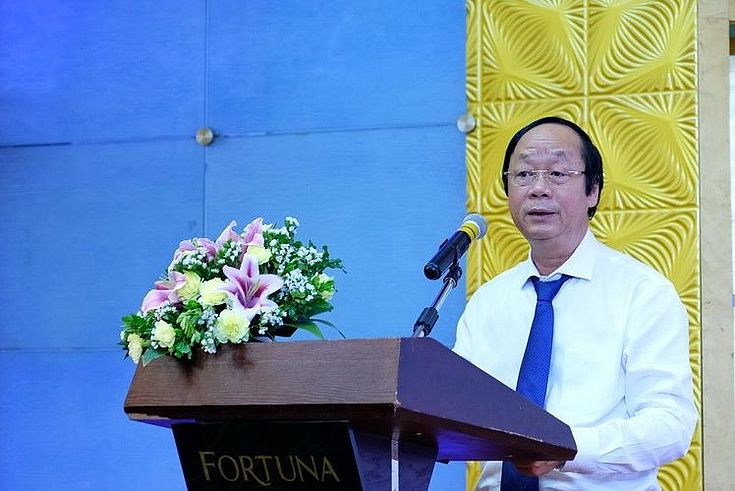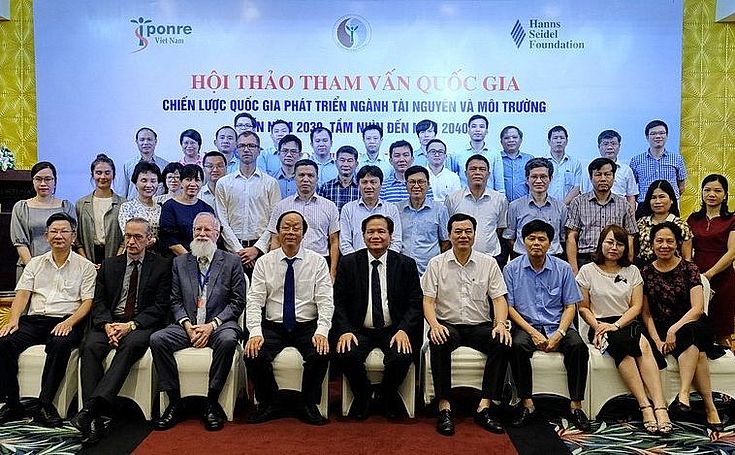HSF supports the formulation of a National Development Strategy for Natural Resources and Environment Sector
Consultation Workshop on the National Development Strategy for Natural Resources and Environment Sector by 2030, Vision to 2040
H.E. Vo Tuan Nhan, Deputy Minister, Ministry of Natural Resources and Environment, delivering an opening speech
HSF
In this regard, a National Development Strategy for Natural Resources and Environment (NRE) Sector by 2030, vision to 2040 is essential in ensuring that the NRE sector develop sustainably, yet in line with the socio-economic development.
A consultation workshop on "Formulating National Development Strategy for Natural Resources and Environment (NRE) Sector by 2030, vision to 2040" was therefore organized by the Institute of Strategy and Policies on Natural Resources with the support of the Hanns Seidel Foundation. The consultation workshop aims to: Consult experts, scientists and officials from central and local management agencies who work in the field of natural resource management and environment protection on the scope, vision and development philosophy of NRE sector in order to provide inputs and recommendations for the framework of national development strategy for NRE sector by 2030, with a vision to 2040.
Group photo with all participants
HSF
Over 80 participants from relevant line ministries and provincial Department of Natural Resources and Environment of Hai Phong, Nam Dinh and Hanoi as well as environmental experts, managers, policy makers, scientists from Research Departments, Universities and Non-Governmental Organizations came together in Hanoi to discuss different challenges and approaches for the upcoming years, regarding the NRE sector in Vietnam.
The role of the NRE sector for Vietnam`s growth and sustainable development as well as achievements and limitations of the sector formed the basis of discussion. Natural Resources and Environment are the foundation for socio-economic growth and development. Anyhow, according to experts, the sector concept is still quite vague. There is a lack of linkages between sectors as well as a lack of transparent decentralization in management. In addition to the fact that the current management still has many shortcomings, Associate Prof. Dr. Nguyen The Chinh, Director General of ISPONRE, states that the natural resources and environment sector faces many challenges and opportunities from the new development trend of the world and the region.
HSF
To formulate the strategy, it is important to monitor the current development of the NRE sector and consider national as well as international contexts that influence NRE. In addition, the participants emphasized the importance of international expertise and experience in NRE management. By comparing with other countries, strengths and weaknesses can be identified and included into the strategy.
During the workshop, experts and decision-makers were able to share experiences and opinions on NRE. By capturing the current situation, approaches and solutions could be developed. For example, it was noted that a technical infrastructure for database and research enhancement are needed to effectively use and manage natural resources, to protect the environment and respond to climate change. Natural resources and environment must also be managed on the basis of market-based approaches, focusing on the role of state.
Pollution and environmental degradation must be prevented to improve the quality of life.
In this way, the main goal to “Improve the effectiveness of natural resource management and utilization in order to meet the needs of socio-economic development, actively control environmental issues and effectively respond to the effects of climate change” can be achieved.
The strategy is expected to be finalized by the end of 2019 and adopted in 2020.



